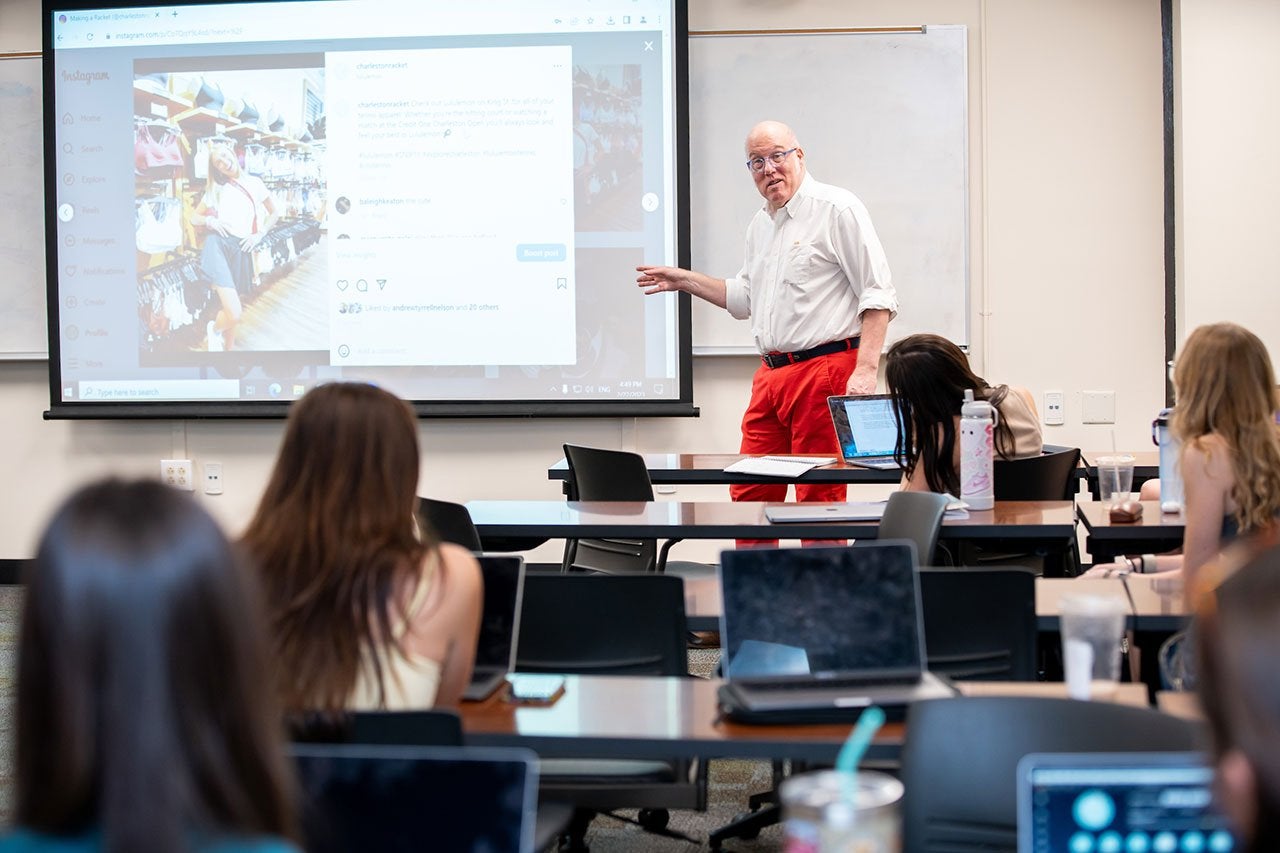Inside a second-floor classroom at the School of Business’ Beatty Center, students are scrolling through their Instagram feeds. Nothing unusual there – except the fact that they’re projected onto a whiteboard and adjunct instructor Andrew Nelson is commenting on their posts.
He advises them to make sure their hashtags are relevant and that they include photo credits, but the real lesson he wants to impart is about making the text that accompanies their posts come alive. “I call it writing with all your senses,” he says, pointing to a post with an exclamation point, that overused piece of punctuation that populates social media. “What is it about this sentence that isn’t strong enough where you had to add one?”
Nelson’s rhetorical comment is at the heart of a popular class in the Department of Hospitality and Tourism Management called Strategic Narrative in Placemaking. Students are on one of three different teams to help Explore Charleston, the city’s convention and visitor’s bureau, promote three events through curated Instagram feeds: the Charleston Jazz Festival, Spoleto Festival USA and the Credit One Charleston Open tennis tournament.

Andrew Nelson critiques his students Instagram posts as part of his course, Strategic Narrative in Placemaking. (Photos by Catie Cleveland)
“Traditionally, tourism and hospitality education is very numbers based – the proverbial heads in beds,” Nelson says. “But the College’s School of Business has been innovative by recognizing there needs to be an expansion of what we define as the business of tourism and by embracing storytelling and strategic narratives.”
As a veteran travel writer who was the editor-at-large for National Geographic Traveler magazine for 11 years, Nelson knows a thing or two about creating an evocative narrative. During the same class, he showed the students an award-winning piece he wrote in 2013 about the start of the sharing economy. Set during his first stay at an Airbnb in San Francisco, he began the story with the memorable line, “Hello, dampness my old friend,” before describing the beautiful décor, bedding and bathroom fixtures. “It’s the best boutique hotel I’ve ever stayed at,” the opening paragraph concluded, “but it’s not a hotel at all. I’m showering in a house of strangers.”
Nelson also regularly has former colleagues from NatGeo, fellow travel writers and photo editors speak to the students, who love the real-world insight.
“This class is one of the most beneficial courses I have taken,” says Avery Unger, a senior majoring in business administration with a concentration in hospitality and tourism management. “We learn things that are not just textbook but real life and from real life experiences. I have learned how to catch a reader’s attention with the first sentence and how editors, writers and creative designers work together. It has opened my eyes and sharpened my mind to things I didn’t know were even an option. I am always so excited to come to class and always leave feeling so thankful and inspired.”
While good storytelling is expected in the best travel writing, Unger and the other 14 students – half of whom are communication majors – can also apply the same lessons of strategic narrative to “destination marketing” techniques for convention and visitor’s bureaus like Explore Charleston and other travel-related marketing firms.
“Good travel writers can communicate a sense of place and a sense of excitement, and a sense of inevitability that you must come here,” Nelson says. “I want the students to get comfortable with thinking like a travel writer about how to observe, how to look and how to communicate that. In the old days, tourism used to be the three hotels downtown, some historic museum and the marketplace that sold souvenirs. But now, thanks to Airbnb and short stays, the entire city is a destination, and we need to talk about these stories.”
Creating a workforce skilled in narrative of place that goes beyond a listing of hotels, restaurants and attractions is vital today to organizations like Explore Charleston.

Travel writer and photographer Paul Jebara is among the guest speakers who have met with Nelson’s class.
“Visitors want a deeper connection to place,” says Doug Warner, the executive vice president of Explore Charleston. “They’re not just looking for where to stay and eat. They want to know about journeys, even the painful ones, and buy products that are reflective of the places they visit. That’s why I’m so excited about what CofC is doing. There aren’t many other schools focused on that.”
The course came about in 2019 when Brumby McLeod, an associate professor in the Department of Hospitality and Tourism Management, met Nelson through a mutual connection at Explore Charleston. Nelson had developed and taught the course – with help from guest speakers – for five years at Loyola University New Orleans, and McLeod thought it could be a good fit at CofC. A potential class offering for fall 2021 became an actual one in spring 2020 when the pandemic forced cancellation of the study abroad programs.
Initially, Nelson filled a need for a passionate practitioner with a cool course to teach, but as anyone who meets the engaging writer with his colorful attire can attest, he’s very captivating.
“He has brought international experience that few have ever experienced in a lifetime, and his travel writing career and publications add credibility to each lecture and lesson,” McLeod says. “Andrew also introduced a network of related international leaders in strategic narrative and creative content around placemaking to our students and the College.”
No exclamation point needed.




